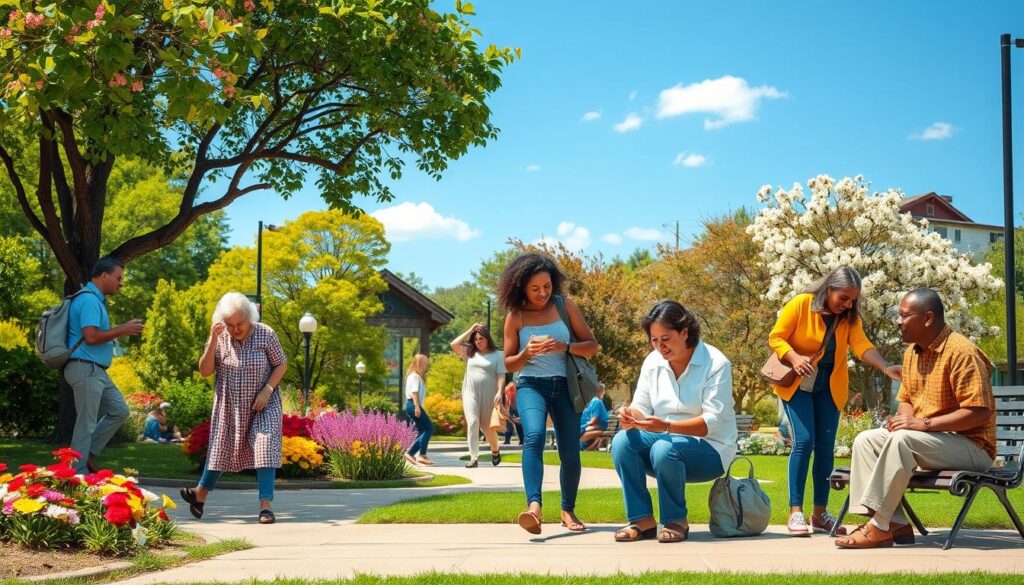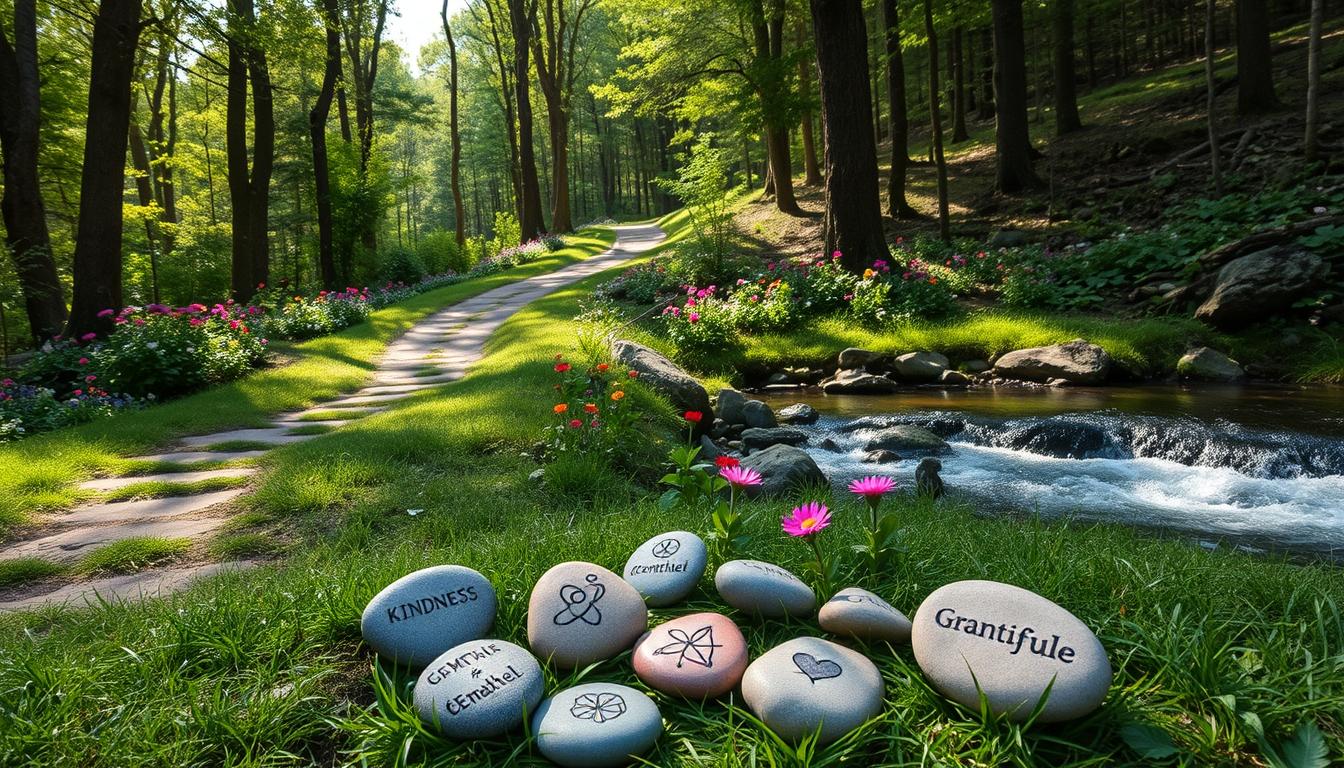Every remarkable journey of personal growth starts with a single step. I’ve struggled with self-improvement, but I’ve learned a lot. My journey showed me that change is a series of small, intentional choices.
Being a better person isn’t about being perfect. It’s about making a commitment to self-improvement. It’s about being kind to yourself and others. Studies show that 78% of people who practice gratitude become more positive and compassionate.
The journey to self-improvement is about understanding your full capacity. It’s about recognizing your strengths and working on your weaknesses. Personal growth is a lifelong journey of learning and evolving.
Table of Contents
Understanding the Foundation of Personal Growth
Starting your journey of personal growth means knowing yourself well. Self-awareness is key to changing your life and reaching your full capacity. It’s about looking inside yourself with honesty and curiosity.
The Role of Self-Awareness in Improvement
Self-awareness is more than just thinking about yourself. It includes:
- Recognizing your emotional patterns
- Understanding your core strengths and weaknesses
- Identifying unconscious behaviors that might hold you back
“Know thyself and thou shalt know the universe.” – Socrates
Setting Your Baseline for Change
To start growing, you need a clear starting point. This means taking a detailed look at where you are now in different areas of your life.
| Life Area | Current Assessment | Growth Potencial |
|---|---|---|
| Emotional Intelligence | Moderate | High |
| Communication Skills | Average | Significant |
| Professional Development | Limited | Substantial |
Identifying Areas for Development
Improving yourself is a planned process. Start by asking yourself important questions:
- What skills do I want to enhance?
- Where do I feel most challenged?
- What patterns repeatedly limit my progress?
Remember, personal growth is not about being perfect but about learning and adapting continuously. By growing in self-awareness, you lay a strong base for real self-improvement and change.
Master the Art of Active Listening
Learning active listening can change how you communicate and connect with others. It’s not just about hearing words. It’s about really getting the message and understanding the person who sent it.
Active listening means you’re fully present and care deeply about what the other person is saying. By doing this, you make a safe space for real talk. Studies show that listening can make up to 40% of a leader’s job performance.
“Listening is a form of acceptance.” – Mihaly Csikszentmihalyi
Here are some key ways to get better at active listening:
- Maintain eye contact to show genuine interest
- Use non-verbal cues like nodding and leaning forward
- Ask open-ended questions to demonstrate engagement
- Paraphrase to confirm understanding
- Avoid interrupting or preparing your response
Improving your listening takes time and effort. A study from Wright State University showed that most people think they listen better than they actually do. This shows how important it is to keep working on it.
| Listening Technique | Impact |
|---|---|
| Reflective Listening | 70% reduction in personal bias |
| Open-Ended Questions | Increases conversation depth by 50% |
| Eliminating Distractions | 60% increase in perceived engagement |
Remember, active listening is a skill that helps in all areas of your life. By being empathetic and truly focused, you’ll make stronger connections and understand others better.
Cultivate Positive Daily Habits
Creating positive daily habits is key to personal growth. Your journey starts with choices that shape your life and mind. Good habits can boost your well-being and growth.
Changing your life begins with small, consistent steps. Studies show daily routines can lead to big personal growth.
Morning Routines for Success
Your morning sets the day’s tone. Here are powerful morning habits:
- Practice 5 minutes of mindfulness meditation
- Write in a daily journal to enhance self-reflection
- Take a brief cold shower to boost alertness
- Set clear, achievable goals for the day
Healthy Lifestyle Choices
A healthy lifestyle is the base of growth. Focus on wellness through smart choices:
- Incorporate nutrient-rich foods into your diet
- Engage in regular physical exercise
- Prioritize quality sleep
- Stay hydrated and maintain balanced nutrition
“Small daily improvements are the key to staggering long-term results.” – Robin Sharma
Building Sustainable Practices
Sustainable habits need consistency and patience. Start small and build up your habits. Lifelong learning and self-improvement are key to a fulfilling life.
Remember, it’s not about being perfect but making progress. Every day is a chance to choose your best self and support your health goals.
Be A Better Person Through Forgiveness

Forgiveness is a journey that heals your heart. At a Neuro Linguistic Programming seminar in Austin, Texas, I learned a forgiveness technique from indigenous Hawaiian culture. It changed how I view letting go of past hurts.
“Forgiveness is not about forgetting, but about freeing yourself from the weight of resentment.”
The technique has four steps:
- Apology: Acknowledging the pain caused
- Please forgive me: Expressing genuine remorse
- Thank you: Showing gratitude for the lesson
- I love you: Releasing emotional barriers
This practice showed me forgiveness’s power. I let go of grudges against family, friends, and co-workers. I felt lighter, calmer, and more present in my life.
| Forgiveness Benefit | Emotional Outcome |
|---|---|
| Releasing Family Tensions | Increased Inner Peace |
| Forgiving Past Relationships | Emotional Freedom |
| Self-Forgiveness | Personal Growth |
Self-forgiveness was a big revelation for me. Seeing my self-judgments helped me heal emotionally. It’s not about excusing wrongs but freeing yourself from negative feelings.
Forgiveness is a choice that helps you more than anyone else. It doesn’t mean forgetting or excusing wrongs. It’s about managing your feelings and opening up to good experiences.
Who can you forgive today?
Embrace Change and Personal Growth
Life is a journey of growth. Embracing change is key to unlocking your full capacity. It makes you adaptable in life’s ups and downs.
As Charles Darwin wisely noted, survival belongs not to the strongest, but to those most adaptable to change.
Stepping Out of Comfort Zones
Your growth starts when you leave your comfort zone. Only 15% of people regularly challenge themselves. They know that growing means facing discomfort.
- Challenge yourself with new experiences
- Learn skills that initially seem intimidating
- Embrace situations that make you slightly nervous
Adapting to New Challenges
Personal growth means adapting to new trends and tech. Think of your career as a changing world. Being flexible is key to success.
“The only way to make sense out of change is to plunge into it, move with it, and join the dance.” – Alan Watts
Learning from Life Experiences
Every experience, good or bad, teaches us something. Reflect on your life, learn from patterns, and grow. Change is about moving forward, not being perfect.
- Reflect on past challenges
- Extract meaningful lessons
- Apply newfound wisdom to future endeavors
By embracing change, you unlock your true self. Your ability to adapt, learn, and grow is the foundation of personal change.
Practice Gratitude and Mindfulness
Starting your journey to a better life is simple. Focus on gratitude and mindfulness. These practices can change how you see the world and make you happier. Studies show they’re key to a better daily life.
“Gratitude turns what we have into enough.” – Unknown
Gratitude is more than just saying thanks. It’s a deep change in how you think. Studies show it can make you happier by changing your brain.
- Gratitude releases serotonin and dopamine, chemicals associated with happiness
- Reduces stress hormones and anxiety levels
- Improves sleep quality and emotional resilience
Begin your mindfulness journey with simple steps. Writing down three things you’re thankful for each night can make a big difference. This habit helps you see the good in life’s small moments.
| Gratitude Practice | Mental Health Impact |
|---|---|
| Gratitude Journal | Decreased stress, improved mood |
| Mindfulness Meditation | Enhanced self-awareness, emotional regulation |
| Expressing Appreciation | Stronger relationships, increased empathy |
Remember, gratitude is a skill that develops with consistent practice. Be patient with yourself as you cultivate this transformative mindset.
By embracing gratitude and mindfulness, you’ll see a positive change. You’ll feel less stressed and connect better with others. Start your journey by noticing the good around you.
Strengthen Your Emotional Intelligence
Emotional intelligence is key to changing your life. It helps you deal with tough social situations, build better relationships, and handle stress.
It’s more than just talking well. It includes five main parts that make your interactions better:
- Self-awareness
- Self-regulation
- Motivation
- Empathy
- Social skills
Understanding Your Emotions
Starting with self-awareness is the first step. Learn to spot and understand what makes you feel certain ways. Most feelings last from seven to 15 minutes but can affect us for a long time. Knowing your emotional patterns helps you handle tough times better.
Building Empathy
Empathy is a big part of emotional intelligence. It lets you connect deeply with others. Now, companies see empathy as a key skill, even testing it when they hire.
Managing Relationships Better
With strong emotional intelligence, managing relationships gets easier. This skill helps you:
- Talk better
- Fix problems in a good way
- Make stronger connections at work and in life
“Emotional intelligence is not about being nice all the time. It’s about being honest and authentic in your interactions.” – Daniel Goleman
| Emotional Intelligence Benefit | Impact |
|---|---|
| Stress Management | Reduces risk of anxiety and depression |
| Career Performance | Improves leadership and motivation skills |
| Personal Relationships | Enhances communication and understanding |
Remember, you can grow your emotional intelligence at any age. Start by noticing your feelings, being empathetic, and asking for feedback. This will help you get better at managing relationships.
Take Action with Kindness and Compassion

Starting to change your life and the world starts with small acts of kindness and compassion. Studies show how these actions can greatly improve our well-being.
“Kindness is a language which the deaf can hear and the blind can see.” – Mark Twain
Compassion is more than just feeling good—it’s backed by science. It can make us healthier mentally and physically. Research finds that doing kind acts can:
- Reduce stress levels
- Lower cortisol production
- Increase endorphin release
- Boost overall happiness
Being kind has big effects beyond just feeling good. Kind workplaces see better teamwork and productivity. Schools with compassion see better mental health and less stress.
Here are some easy ways to add kindness to your day:
- Volunteer for local groups
- Do random acts of kindness
- Support non-profits
- Listen well to others
People who volunteer and show compassion live longer, healthier lives. By being compassionate, you help others and create positive change in your community.
Remember, caring for yourself is key to showing compassion. Mindfulness and loving-kindness meditation help you feel more empathy and connection with everyone.
Conclusion
Improving yourself is a journey that never ends. It takes patience, self-reflection, and a real commitment. Just like Dr. Ludwig Guttmann, you can turn challenges into chances for growth. This happens through actions and changes in how you think.
This journey is not about being perfect. It’s about making progress every day. Small actions, like listening well or being kind, add up. Parker Palmer says that how we treat others shapes us, showing the value of being gentle and curious.
Being skeptical and critical helps you grow. Testing your beliefs and staying open to new ideas lets you truly grow. David Brooks talks about being an “Illuminator,” someone who connects with others by being open and generous.
Your self-reflection is key to changing for the better. Every experience is a chance to learn and grow. Your journey is unique, filled with both challenges and victories. Keep going, be kind to yourself, and know that becoming your best self is a journey worth taking.
FAQ
How long does personal growth take?
Personal growth is a lifelong journey. It needs consistent effort and self-reflection. There’s no set timeline for improvement, as it varies for each individual. The key is to make continuous small changes and be patient with yourself.
Celebrate small victories and remain committed to your personal development goals.
What are the most important skills for becoming a better person?
Important skills include active listening, emotional intelligence, empathy, self-awareness, and the ability to practice forgiveness. Developing positive daily habits, embracing change, and showing kindness to others are also essential. These skills help you build better relationships and contribute positively to society.
How can I start improving myself today?
Start with small, manageable steps. Begin a gratitude journal, practice active listening, or try a short meditation session. Focus on developing a morning routine that includes self-reflection, set realistic goals, and be open to learning from your experiences.
Remember, personal growth is about consistent, incremental improvements.
Why is self-awareness important in personal growth?
Self-awareness is key because it helps you understand your strengths, weaknesses, emotions, and behavior patterns. It provides a baseline for personal improvement by allowing you to identify areas that need development. By being self-aware, you can make more intentional choices and understand your reactions.
How can I develop emotional intelligence?
Develop emotional intelligence by first understanding your own emotions. Recognize what triggers them and how you typically respond. Practice empathy by trying to understand others’ perspectives, learn to manage your emotions effectively, and improve your communication skills.
Start by observing your emotional reactions, seeking feedback, and consciously working on your ability to understand and relate to others.
What role does forgiveness play in personal growth?
Forgiveness is a powerful tool for emotional healing and personal growth. It doesn’t mean forgetting or excusing harmful actions, but releasing negative emotions that hold you back. Forgiving others and yourself helps reduce stress, opens up space for positive emotions, and allows you to move forward.
It’s a process that takes time but can significantly improve your mental and emotional well-being.
How can I build positive daily habits?
Start small and be consistent. Develop a productive morning routine that might include meditation, exercise, or goal-setting. Choose activities you can realistically maintain, such as reading for 15 minutes daily, practicing gratitude, or learning a new skill.
Focus on making healthy lifestyle choices like maintaining a balanced diet, getting enough sleep, and exercising regularly. Remember that habit formation takes time and patience.

